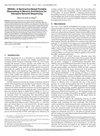考虑对能效有害的LLM混合专家权重的SSD卸载
IF 1.4
3区 计算机科学
Q4 COMPUTER SCIENCE, HARDWARE & ARCHITECTURE
引用次数: 0
摘要
大型语言模型(llm)将混合专家(MoE)规模应用于数万亿参数,但需要巨大的内存,这促使一系列研究将专家权重从快速但小型的DRAM (HBM)转移到更密集的闪存ssd上。虽然ssd提供了经济高效的容量,但它们的每比特读取能量大大高于DRAM。本文定量分析了在LLM推理的关键解码阶段将MoE专家权值卸载到ssd的能量影响。我们的分析,比较了SSD、CPU内存(DDR)和HBM存储场景的模型,如DeepSeek-R1,揭示了将MoE权重卸载到当前的SSD上大大增加了每个令牌生成的能量消耗(例如,与HBM基线相比,高达12倍),主导了总推理能量预算。尽管像预取这样的技术有效地隐藏了访问延迟,但它们不能减轻这种基本的能量损失。我们进一步探索了未来的技术规模,发现MoE模型的固有稀疏性可能会使ssd的能量可行,如果闪存读取能量显着提高,大约一个数量级。本文章由计算机程序翻译,如有差异,请以英文原文为准。
SSD Offloading for LLM Mixture-of-Experts Weights Considered Harmful in Energy Efficiency
Large Language Models (LLMs) applying Mixture-of-Experts (MoE) scale to trillions of parameters but require vast memory, motivating a line of research to offload expert weights from fast-but-small DRAM (HBM) to denser Flash SSDs. While SSDs provide cost-effective capacity, their read energy per bit is substantially higher than that of DRAM. This paper quantitatively analyzes the energy implications of offloading MoE expert weights to SSDs during the critical decode stage of LLM inference. Our analysis, comparing SSD, CPU memory (DDR), and HBM storage scenarios for models like DeepSeek-R1, reveals that offloading MoE weights to current SSDs drastically increases per-token-generation energy consumption (e.g., by up to $\sim 12\times$
求助全文
通过发布文献求助,成功后即可免费获取论文全文。
去求助
来源期刊

IEEE Computer Architecture Letters
COMPUTER SCIENCE, HARDWARE & ARCHITECTURE-
CiteScore
4.60
自引率
4.30%
发文量
29
期刊介绍:
IEEE Computer Architecture Letters is a rigorously peer-reviewed forum for publishing early, high-impact results in the areas of uni- and multiprocessor computer systems, computer architecture, microarchitecture, workload characterization, performance evaluation and simulation techniques, and power-aware computing. Submissions are welcomed on any topic in computer architecture, especially but not limited to: microprocessor and multiprocessor systems, microarchitecture and ILP processors, workload characterization, performance evaluation and simulation techniques, compiler-hardware and operating system-hardware interactions, interconnect architectures, memory and cache systems, power and thermal issues at the architecture level, I/O architectures and techniques, independent validation of previously published results, analysis of unsuccessful techniques, domain-specific processor architectures (e.g., embedded, graphics, network, etc.), real-time and high-availability architectures, reconfigurable systems.
 求助内容:
求助内容: 应助结果提醒方式:
应助结果提醒方式:


